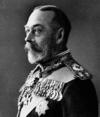- George V
-
1865-1936, king of England 1910-36 (son of Edward VII).
* * *
died Jan. 20, 1936, Sandringham, NorfolkKing of the United Kingdom (1910–36).The second son of the future Edward VII, he succeeded his father in 1910. Early in his reign, he faced problems resulting from the constitutional struggle to restrict the power of the House of Lords. Respect for the new king increased during World War I, and he visited the front in France several times. After the war he faced both serious industrial unrest and, in 1923, the resignation as prime minister of Andrew Bonar Law, who was replaced by Stanley Baldwin. After the collapse of the pound sterling and the subsequent financial crisis in 1931, he persuaded James Ramsay MacDonald to remain in office and form a national coalition government. He was succeeded successively by his sons Edward VIII and George VI. George V.Camera Press
George V.Camera Press* * *
▪ king of Hanoverborn May 27, 1819, Berlindied June 12, 1878, Parislast king of Hanover (1851–66), only son of Ernest Augustus, king of Hanover and Duke of Cumberland.His youth was passed in England and in Berlin until 1837, when his father became king of Hanover. He lost sight in one eye during a childhood illness and in the other by an accident in 1833. Blindness debarred him from a knowledge of the world; he formed a fantastic conception of the dignity of the house of Welf and had ideas of founding a great Welf state in Europe. From his accession in November 1851 he was constantly disputing with the diet, contrary to whose wishes he refused Prussia's (Prussia) demand for the unarmed neutrality of Hanover during the Austro-Prussian War of 1866. This led to an immediate Prussian invasion, the surrender of George's army on June 29, 1866, and Prussia's formal annexation of Hanover in September. The king subsequently lived in Austria or in France. He died in Paris and was buried in St. George's Chapel, Windsor. His son, Ernest Augustus, Duke of Cumberland (1845–1943), continued to maintain the claim of his house to the kingdom of Hanover.▪ king of United Kingdomborn June 3, 1865, London, Eng.died Jan. 20, 1936, Sandringham, Norfolkking of the United Kingdom from 1910 to 1936, the second son of Prince Albert Edward, later King Edward VII.He served in the navy until the death (1892) of his elder brother, Prince Albert Victor, brought the need for more specialized training as eventual heir to the throne. Created Duke of York (May 1892), he married (July 1893) Princess Mary of Teck, who had been his brother's fiancée. Created Duke of Cornwall and Prince of Wales after his father's accession (1901), he succeeded his father on May 6, 1910, and was crowned on June 22, 1911.Formidable difficulties faced the new king early in his reign. The constitutional struggle to curb the power of the House of Lords (Lords, House of) was unresolved, and the Liberal government secured an undertaking from the king that, should the lords not yield, he would create sufficient new peers to overcome the opposition. After the Liberal success in the election of December 1910, the House of Lords relented and passed the Parliament Act (1911), and the king did not have to fulfill his pledge. Respect for King George greatly increased during World War I, and he visited the front in France several times.After World War I the king was confronted by an outbreak of serious industrial unrest. He was also faced with a difficult decision on the resignation of Andrew Bonar Law in 1923, when he had to find a new prime minister. Both Lord Curzon and Stanley Baldwin had supporters among the elder statesmen whom George consulted, but, believing Baldwin had more support in the Conservative Party and that the prime minister should be in the House of Commons, the king selected him.King George was seriously ill at the end of 1928, and for the rest of his reign he had to be extremely careful of his health. In 1931 the collapse of the pound and the consequent financial crisis split the Labour administration. To secure strong government, he persuaded Ramsay MacDonald and a part of his Cabinet to remain in office and join with Conservative and Liberal ministers in the formation of a national coalition government. The celebration of George's silver jubilee (May 1935) enabled the public to express its affection and admiration for him.King George had five sons—King Edward VIII (later Duke of Windsor); King George VI; Henry, Duke of Gloucester; George, Duke of Kent; and Prince John, who died young—and one daughter, Mary, princess royal, who married the 6th Earl of Harewood.Additional ReadingKenneth Rose, King George V (1983), studies both the monarch and the man.* * *
Universalium. 2010.
